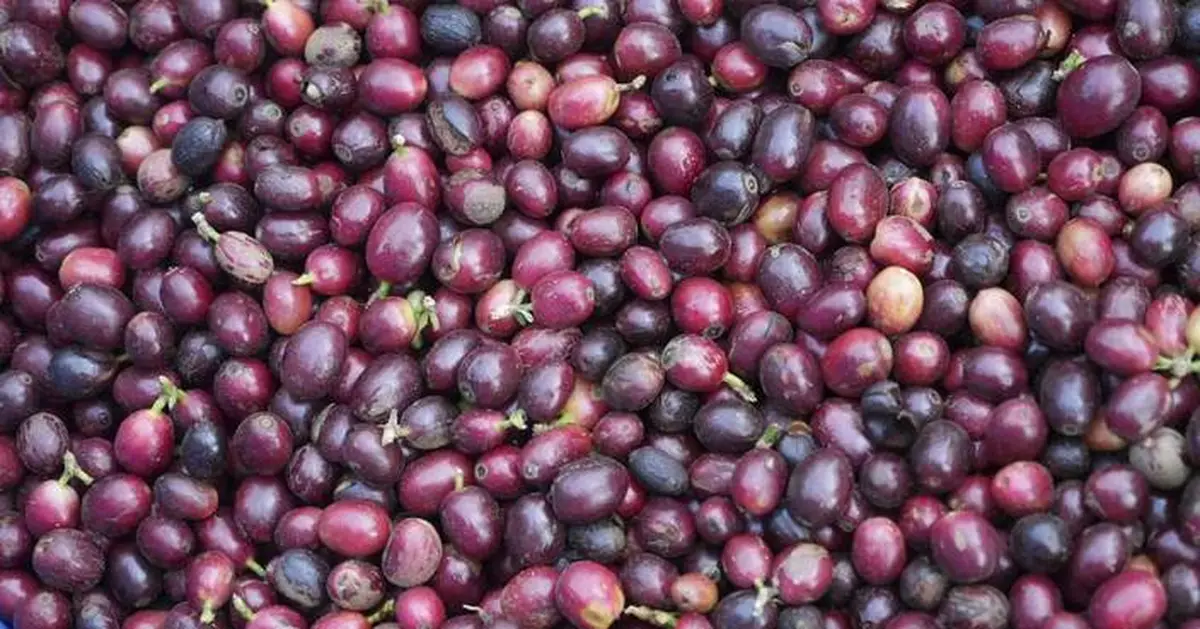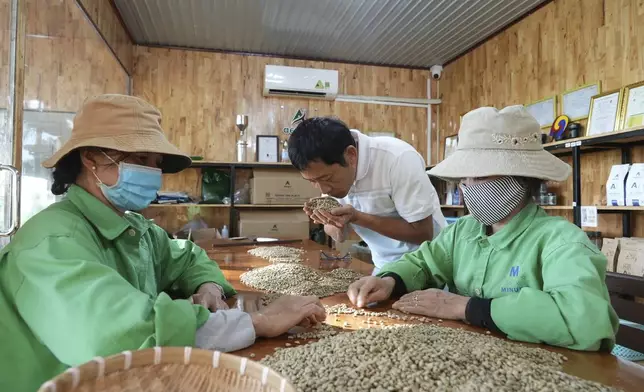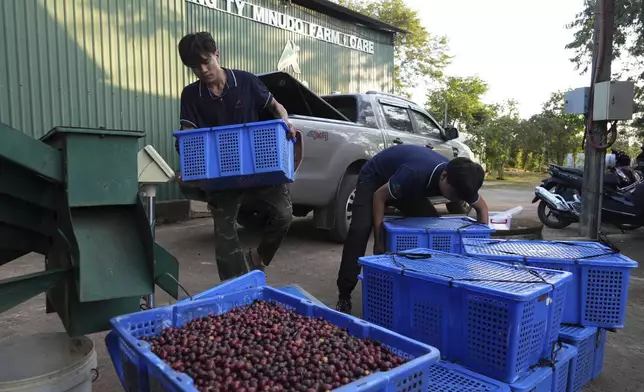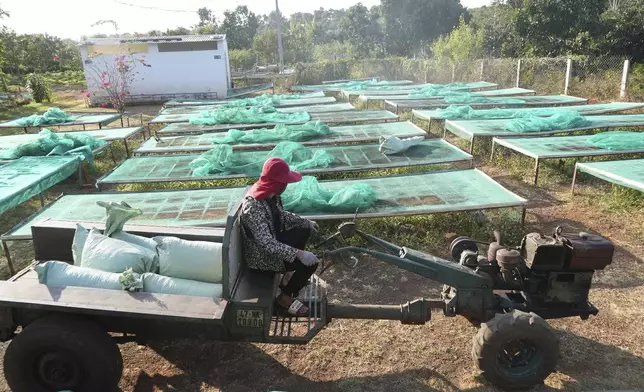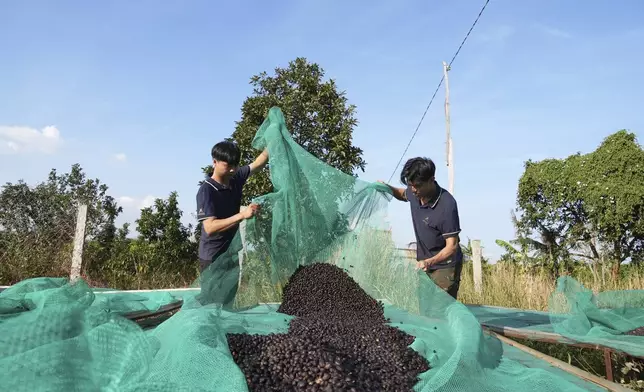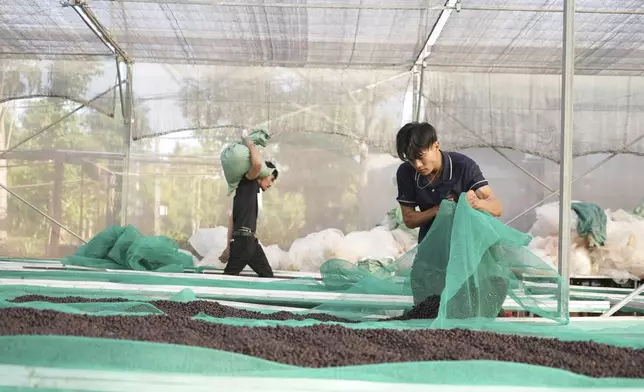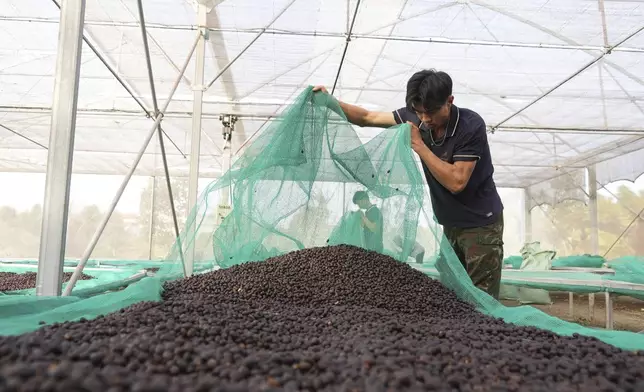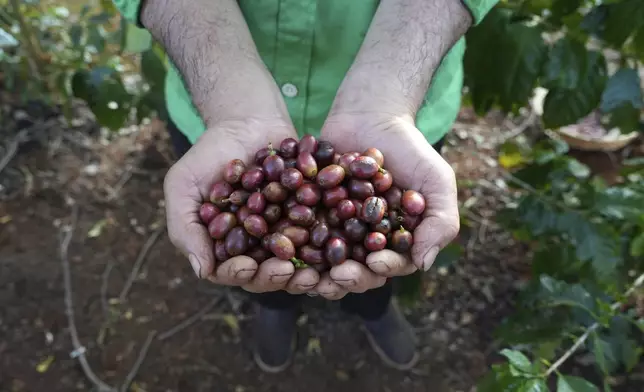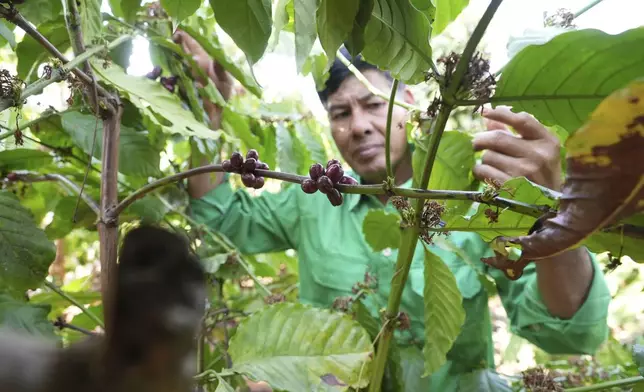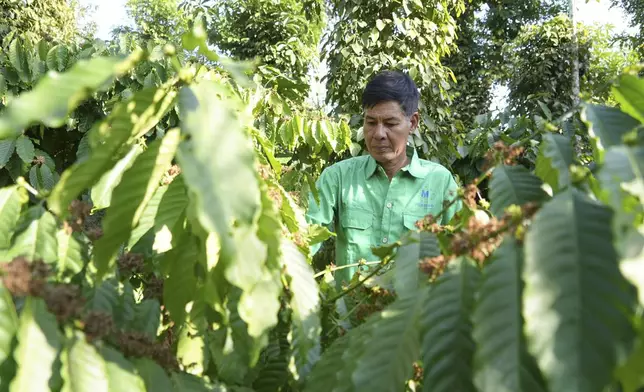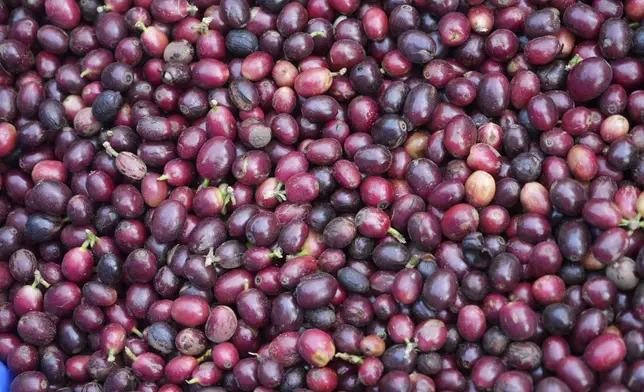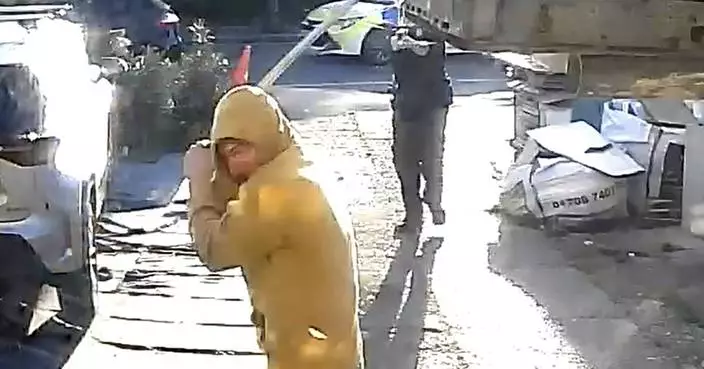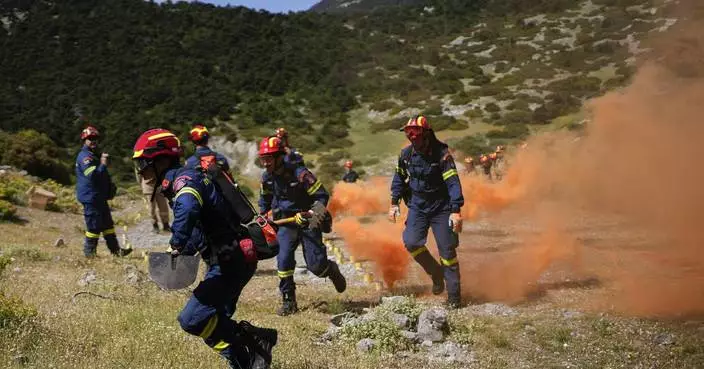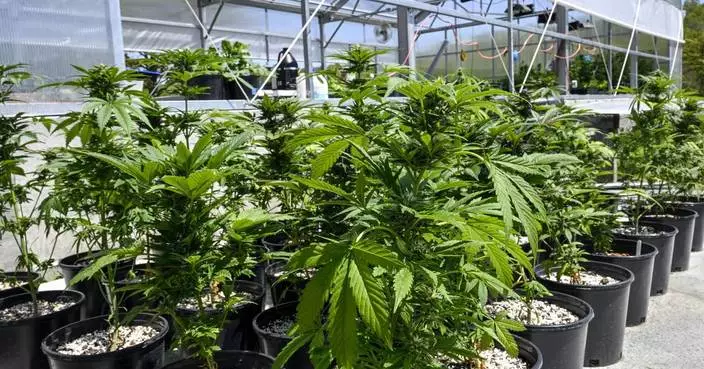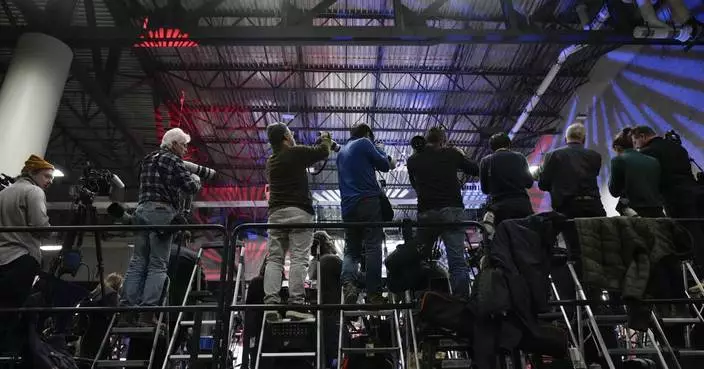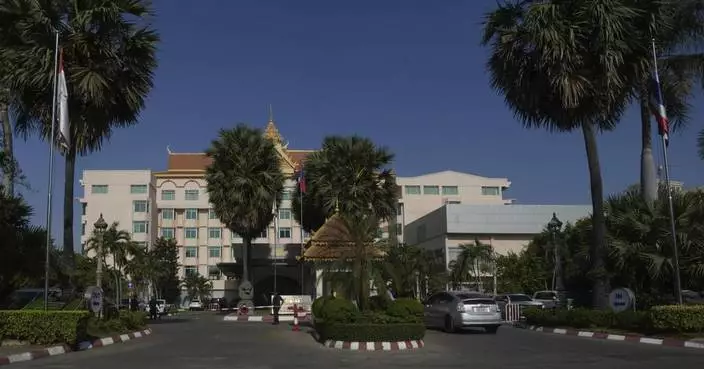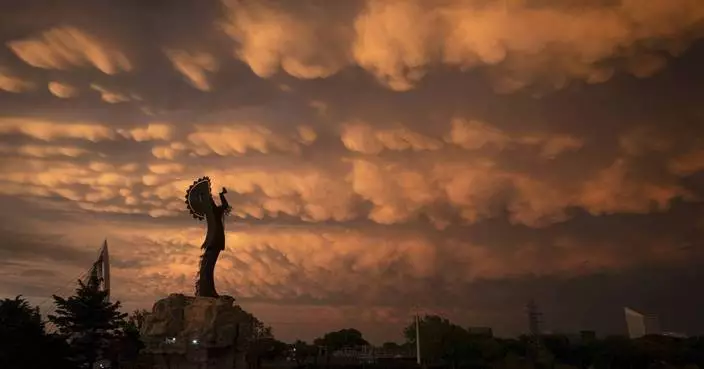BUON MA THUOT, Vietnam (AP) — Le Van Tam is no stranger to how the vagaries of global trade can determine the fortunes of small coffee farmers like him.
He first planted coffee in a patch of land outside Buon Ma Thuot city in Vietnam's Central Highland region in 1995. For years, his focus was on quantity, not quality. Tam used ample amounts of fertilizer and pesticides to boost his yields, and global prices determined how well he did.
Then, in 2019, he teamed up with Le Dinh Tu of Aeroco Coffee, an organic exporter to Europe and the U.S., and adopted more sustainable methods, turning his coffee plantation (field) into a a sun-dappled forest. The coffee grows side-by-side with tamarind trees that add nitrogen to the soil and provide support for black pepper vines. Grass helps keep the soil moist and the mix of plants discourages pest outbreaks. The pepper also adds to Tam's income.
“The output hasn’t increased, but the product’s value has,” he said.
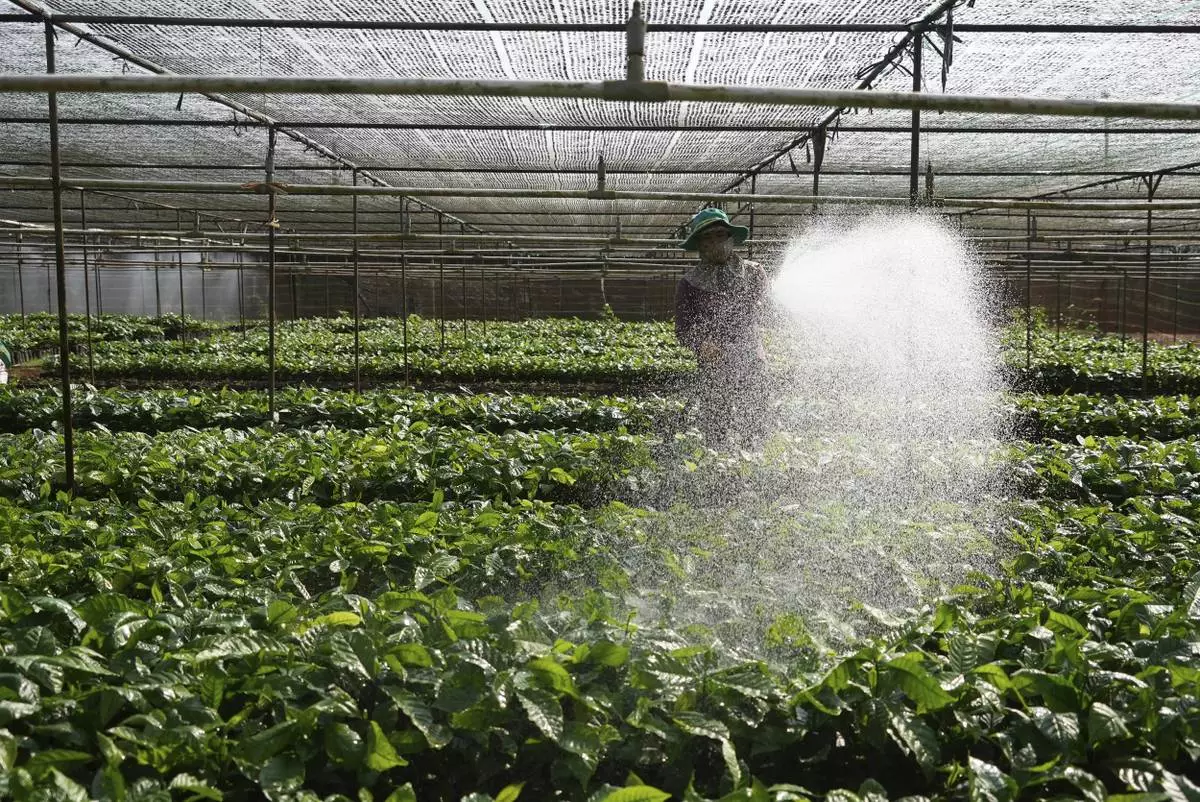
A worker waters coffee plants at a nursery garden in Dak Lak province, Vietnam on Feb. 2, 2024. New European Union rules aimed at stopping deforestation are reordering supply chains. An expert said that there are going to be "winners and losers" since these rules require companies to provide detailed evidence showing that the coffee isn't linked to land where forests had been cleared. (AP Photo/Hau Dinh)
In the 1990s, Tam was among thousands of Vietnamese farmers who planted more than a million hectares of coffee, mostly robusta, to take advantage of high global prices. By 2000, Vietnam had become the second-largest producer of coffee, which provides a tenth of its export income.
Vietnam is hoping that farmers like Tam will benefit from a potential reordering of how coffee is traded due to more stringent European laws to stop deforestation.
The European Deforestation Regulation or EUDR will outlaw sales of products like coffee from December 30, 2024, if companies can't prove they are not linked with deforestation. The new rules don't just seek to reduce risks of illegal logging and its scope is wide: It will apply to cocoa, coffee, soy, palm oil, wood, rubber, and cattle. To sell those products in Europe big companies will have to provide evidence showing they come from land where forests haven't been cut since 2020. Smaller companies have till July 2025 to do so.
It's not failsafe. Companies can just sell products that don't meet the new requirements elsewhere, without reducing deforestation. Thousands of small farmers unable to provide the potentially expensive data could be left out. Much depends on how countries and companies react to the new laws, Bellfield said. Countries must help smaller farmers by building national systems ensure their exports are traceable. Otherwise, companies may just buy from very large farms that can prove they have complied.
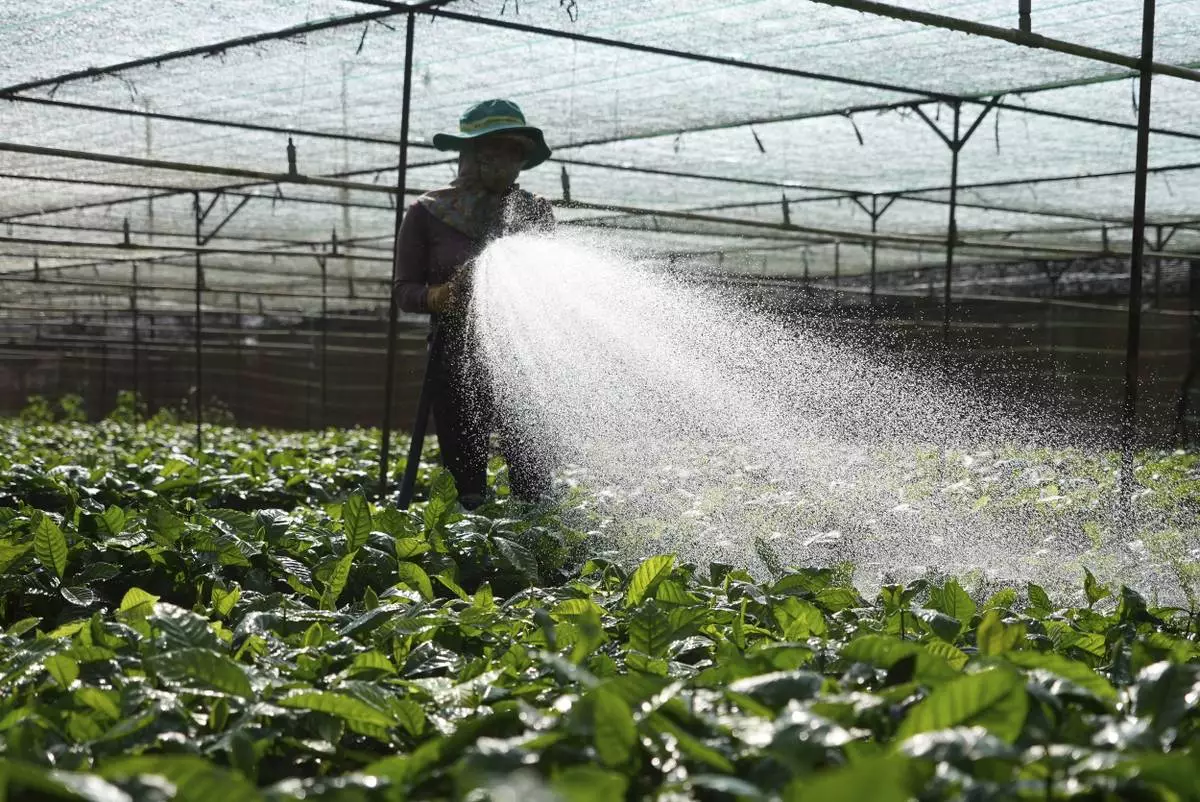
A worker waters coffee plants at a nursery garden in Dak Lak province, Vietnam, on Feb. 2, 2024. New European Union rules aimed at stopping deforestation are reordering supply chains. An expert said that there are going to be "winners and losers" since these rules require companies to provide detailed evidence showing that the coffee isn't linked to land where forests had been cleared. (AP Photo/Hau Dinh)
Already, orders for Ethiopian grown coffee have fallen. And Peru lacks the capacity to provide information needed for coffee and cocoa grown in the Peruvian Amazon.
This is on top of other challenges, which in Vietnam include worsening droughts and receding ground water levels.
“There will be winners and losers,” she said.
Vietnam can't afford to lose — Europe is the largest market for its coffee, comprising 40% of its coffee exports. Six weeks after the EUDR was approved, Vietnam's agriculture ministry started working to prepare coffee growing provinces for the shift. It has since rolled out a national plan that includes a database of where crops are grown and mechanisms to make this information traceable.
The Southeast Asian nation has long promoted more sustainable farming methods, viewing laws like the EUDR as an “an inevitable change," according to an August 2023 agriculture ministry communique. The EUDR could help accelerate such a transformation, according to agriculture minister Le Minh Hoang.
Tam and Tu, his export partner, were quick to adapt.
Even if the costs are higher, Tu said, they can get better prices for their high quality coffee

Workers sort and grade coffee beans at a coffee factory in Dak Lak province, Vietnam on Feb. 1, 2024. New European Union rules aimed at stopping deforestation are reordering supply chains. An expert said that there are going to be "winners and losers" since these rules require companies to provide detailed evidence showing that the coffee isn't linked to land where forests had been cleared. (AP Photo/Hau Dinh)
“We must choose the highest quality. Otherwise, we will always be laborers,” Tu said, while sipping a cup of his favorite coffee at his company's coffee processing factory adjoining Tam's farm. This is where trucks laden with red coffee cherries, both robusta and arabica, arrive from other farms, where the pulp of the fruit removed and beans of coffee laid out on tables to dry in the sun.
Tu already has certificates from international agencies for sustainability that will enable him to deal with the EUDR. Such certificates typically address the issue of deforestation, although some tweaks may be needed, said David Hadley, program director for regulatory impacts at the non-profit group Preferred by Nature in Costa Rica.
Ensuring that Vietnam's roughly half a million small farmers, who produce about 85% of its coffee, are able to collect and provide data showing their farms did not cause deforestation remains a challenge. Some may struggle to use smartphones to collect geolocation coordinates. Small exporters need to set up systems to prevent other uncertified products from being mixed with coffee that meets EUDR requirements, said Loan Le of International Economics Consulting.
Farmers also will need documents proving they have complied with national laws for land use, environmental protection and labor, Le said. Moreover, coffee's long value chain — from producing beans to collecting them and processing them — requires digital systems to ensure records are error-free.
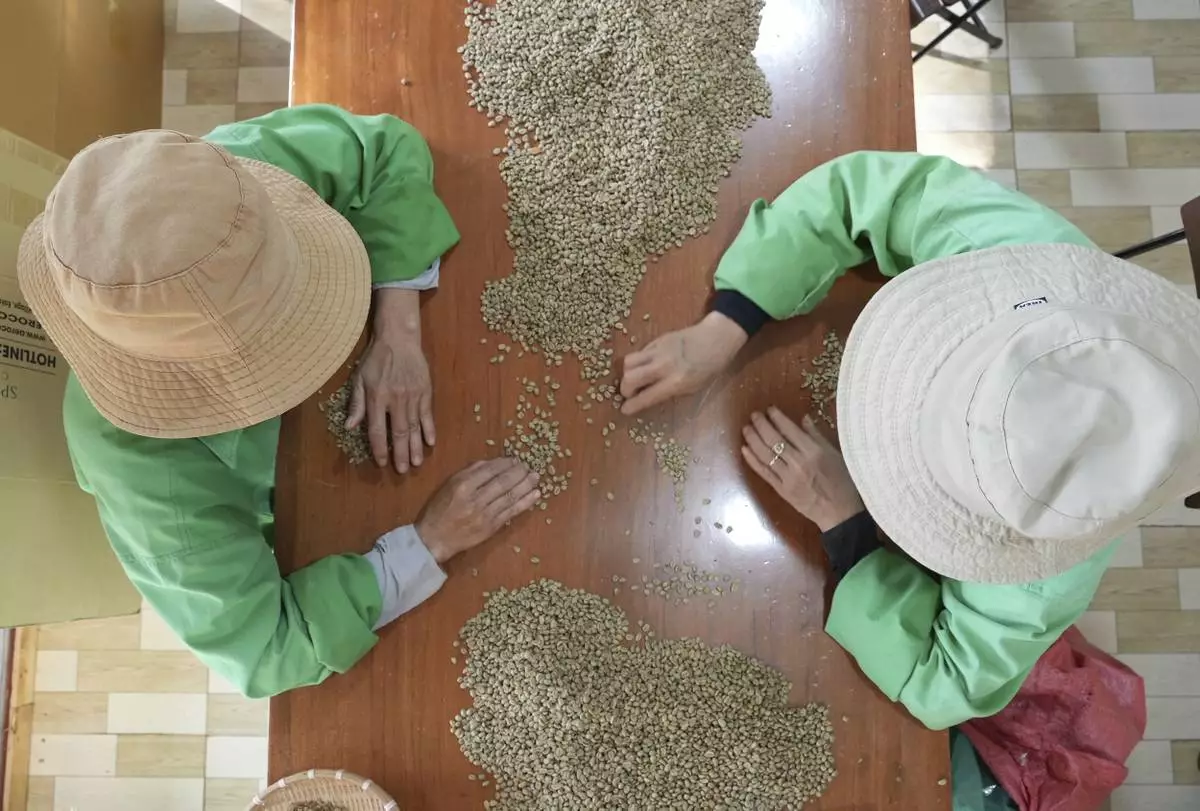
Workers sort and grade coffee beans at a coffee factory in Dak Lak province, Vietnam, on Feb. 1, 2024. New European Union rules aimed at stopping deforestation are reordering supply chains. An expert said that there are going to be "winners and losers" since these rules require companies to provide detailed evidence showing that the coffee isn't linked to land where forests had been cleared. (AP Photo/Hau Dinh)
Brazil, the world’s largest coffee producer, is better placed, said Bellfield of Global Canopy, since its coffee grows on plantations that far are away from forests and it has a relatively well organized supply chain. Also, Brazilian-grown coffee is most likely to meet the EUDR requirements, according to a 2024 Brazilian study, because much of it is exported to the EU, Brazil has fewer small farmers, and about a third of its coffee growing acreage already has some kind of sustainability certification.
The EUDR has acknowledged concerns for less well prepared suppliers by giving them more time and said the European government will work with impacted countries to “enable the transition” while “paying particular attention” to the needs of small holders and Indigenous communities. A review in 2028 will also look at impacts on smallholders.
"Despite this we still anticipate it being costly and difficult for small holder farming communities,” she said.
In Peru, collecting information about hundreds of thousands of small farmers is difficult given the country's weak institutions and the fact that most farmers lack land titles, according to a study of EUDR impacts by the Amazon Business Alliance, a joint-initiative by USAID, Canada and the nonprofit group Conservation International.
Ethiopia, where coffee makes up about a third of total export earnings according to a U.S. Department of Agriculture report, has been slow to react. The national plan it rolled out in February 2024 fails to resolve the fundamental issue of how to gather required data from millions of small farmers and provide that information to buyers, said Gizat Worku, head of the Ethiopian Coffee Exporters Association.
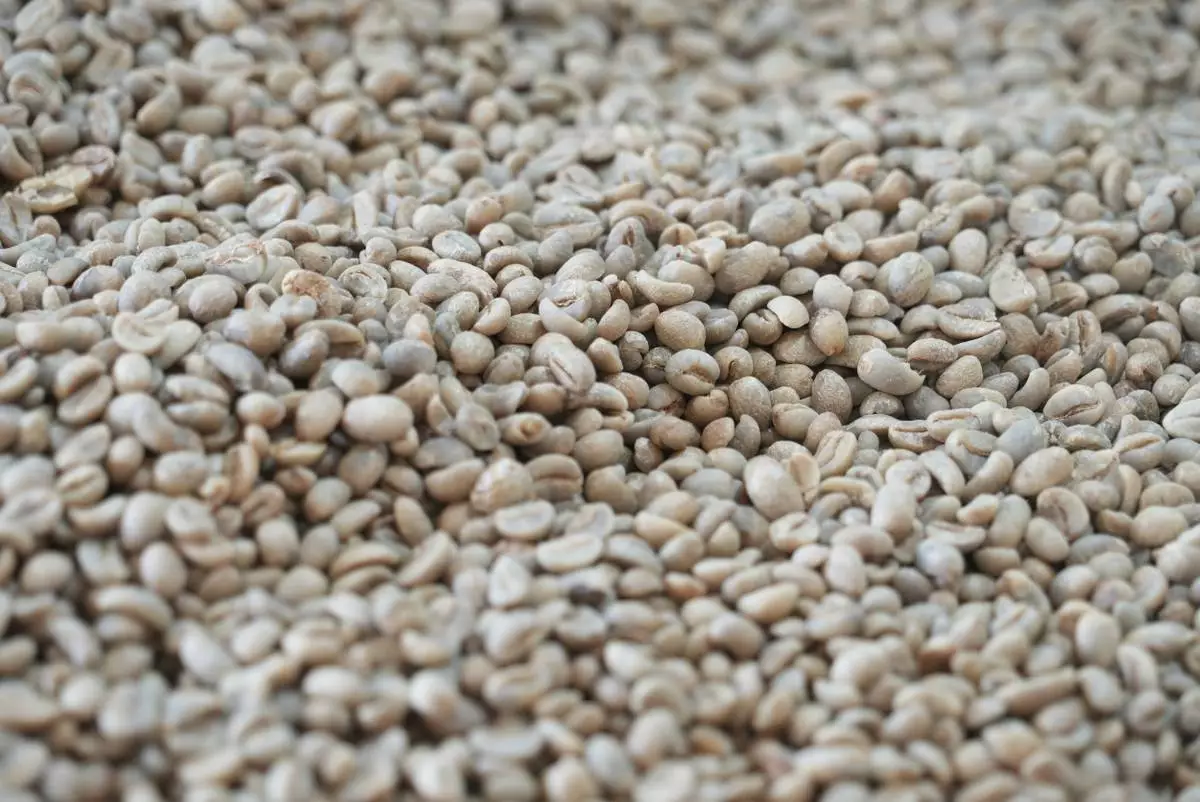
Coffee beans after being processed seen at a coffee factory in Dak Lak province, Vietnam, on Feb. 1, 2024. New European Union rules aimed at stopping deforestation are reordering supply chains. An expert said that there are going to be "winners and losers" since these rules require companies to provide detailed evidence showing that the coffee isn't linked to land where forests had been cleared. (AP Photo/Hau Dinh)
“That requires a huge amount of resources,” he said
Gizat, who like many Ethiopians goes by his first name, said that orders are falling due to doubts about the country's ability to comply with the EUDR. Some traders are contemplating switching to other markets, like the Middle East or China, where Ethiopian coffee is “booming,” he said. But switching markets isn't easy.
“These regulations are going to have a tremendous impact,” Gizat said.
The Associated Press’ climate and environmental coverage receives financial support from multiple private foundations. AP is solely responsible for all content. Find AP’s standards for working with philanthropies, a list of supporters and funded coverage areas at AP.org.

Workers unload baskets of freshly picked coffee beans at a coffee factory in Dak Lak province, Vietnam on Feb. 1, 2024. New European Union rules aimed at stopping deforestation are reordering supply chains. An expert said that there are going to be "winners and losers" since these rules require companies to provide detailed evidence showing that the coffee isn't linked to land where forests had been cleared. (AP Photo/Hau Dinh)

A worker transports bags of coffee beans after drying at a coffee factory in Dak Lak province, Vietnam on Feb. 1, 2024. New European Union rules aimed at stopping deforestation are reordering supply chains. An expert said that there are going to be "winners and losers" since these rules require companies to provide detailed evidence showing that the coffee isn't linked to land where forests had been cleared. (AP Photo/Hau Dinh)

Workers dry coffee beans at a coffee factory in Dak Lak province, Vietnam on Feb. 1, 2024. New European Union rules aimed at stopping deforestation are reordering supply chains. An expert said that there are going to be "winners and losers" since these rules require companies to provide detailed evidence showing that the coffee isn't linked to land where forests had been cleared. (AP Photo/Hau Dinh)

Workers dry coffee beans at a coffee factory in Dak Lak province, Vietnam on Feb. 1, 2024. New European Union rules aimed at stopping deforestation are reordering supply chains. An expert said that there are going to be "winners and losers" since these rules require companies to provide detailed evidence showing that the coffee isn't linked to land where forests had been cleared. (AP Photo/Hau Dinh)

Workers dry coffee beans at a coffee factory in Dak Lak province, Vietnam, on Feb. 1, 2024. New European Union rules aimed at stopping deforestation are reordering supply chains. An expert said that there are going to be "winners and losers" since these rules require companies to provide detailed evidence showing that the coffee isn't linked to land where forests had been cleared. (AP Photo/Hau Dinh)

Farmer Le Van Tam holds up freshly picked coffee beans at a coffee farm in Dak Lak province, Vietnam on Feb. 1, 2024. New European Union rules aimed at stopping deforestation are reordering supply chains. An expert said that there are going to be "winners and losers" since these rules require companies to provide detailed evidence showing that the coffee isn't linked to land where forests had been cleared. (AP Photo/Hau Dinh)

Farmer Le Van Tam tends coffee plants at a coffee farm in Dak Lak province, Vietnam on Feb. 1, 2024. New European Union rules aimed at stopping deforestation are reordering supply chains. An expert said that there are going to be "winners and losers" since these rules require companies to provide detailed evidence showing that the coffee isn't linked to land where forests had been cleared. (AP Photo/Hau Dinh)

Farmer Le Van Tam tends coffee plants at a coffee farm in Dak Lak province, Vietnam on Feb. 1, 2024. New European Union rules aimed at stopping deforestation are reordering supply chains. An expert said that there are going to be "winners and losers" since these rules require companies to provide detailed evidence showing that the coffee isn't linked to land where forests had been cleared. (AP Photo/Hau Dinh)

Coffee beans are seen in basket after being picked at a coffee farm in Dak Lak province, Vietnam, on Feb. 1, 2024. New European Union rules aimed at stopping deforestation are reordering supply chains. An expert said that there are going to be "winners and losers" since these rules require companies to provide detailed evidence showing that the coffee isn't linked to land where forests had been cleared. (AP Photo/Hau Dinh)


